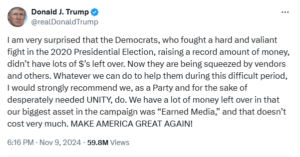We support our Publishers and Content Creators. You can view this story on their website by CLICKING HERE.
Around New Year’s, I have sometimes posted a recap of books I read during the preceding year. I am not doing that this year, partly because I finished the complete works of John D. MacDonald, which is somewhat embarrassing. Instead, I want to note Mark Helprin’s contribution to the Claremont Reviews of Books’ Christmas Review, about which Scott has written, and to which he contributed.
Helprin’s “reading highlight” of 2024 is the Eleventh Edition of the Encyclopedia Britannica, copyrighted 1910 and 1911 in the U.S.–perhaps the most famous version of that venerable publication:
I frequently turn to what may be the most interesting, authoritative, and comprehensive book in the world. That is the compact version of The Encyclopedia Britannica, 11th Edition, wonderfully squozen (to quote Samuel Goldwyn) into 29 paperback-sized, 1,000-page volumes. The stock is thin, crisp, and acid-free, the print very small but easily readable and enjoyable in itself, and the quality of the scholarship spectacular. Of course, as it is more than a hundred years out of date, many of its articles must be read with caution and hindsight. But in the main it is beautifully written and authoritative—and calming, too, as it is so far removed from the totalitarian ideological seepage that has stained almost every aspect of modern intellectual life.
Yes. An encyclopedia that does not have an entry on Lenin! It harkens back to a better time. More about that shortly.
Pulling it off the shelf and reading at random is intensely satisfying and entertaining, especially in its treatment of things—such as dredging, batrachia, the Ostade, the cat, and every possible obscurity of England and the Empire—that might not jump out at you from cable news. I looked up the small town where I grew up and was pleased to find it beautifully and accurately portrayed. In short, knowledge as pleasure.
Unlike Mr. Helprin, I do not have to rely on a recent paperback printing of the Encyclopedia Britannica, 11th Edition, because I own an original. I inherited it from my paternal grandmother, Dagny Hinderaker, on her death. It occupies a proud place in my library:
As Helprin says, the 11th Edition is “beautifully written and authoritative.” And, given its publication date, it is an artifact of a better time. No Lenin! No Hitler! No Stalin! No Mao! The world, to a considerable degree, as we would wish it to be.
And the volumes’ appeal is enhanced by my grandmother’s lifelong habit of inserting newspaper clippings into appropriate alphabetical slots in the Britannica volumes. I never know what I might stumble across.
Until now, it had never occurred to me to wonder how my grandmother acquired this intellectual gem, which she passed on to me. She was born, I believe, in 1888, so she might have bought the encyclopedia when it was new, as a young woman. But that is unlikely. She and her family were poor, their poverty exceeded only by the abject penury of my mother’s side of the family after my maternal grandfather’s early death. So I think she must have acquired it, second-hand, at some later time.
Dagny was a poet. I think she may have been the poet laureate of South Dakota at some point, but I could be wrong about that. In any event, quite a few of her poems were published in Pasque Petals, the publication of South Dakota’s literary or poetic society.
But Dagny had a problem: with six children, and the Depression in full swing, she couldn’t afford to buy pencils. In Lutheran churches, it is customary to put small, eraser-less pencils in the pews. So the minister of the Lutheran church in her town of 200 would save those pencil ends, when they had gotten too short to be used in the pews, and give them to my grandmother. She used those pencil stubs to write her poetry.
One year, my father’s older brother, who was always enterprising and later became a successful and respected doctor, had an idea: he did odd jobs for neighbors throughout the year, for a penny at a time. And he used that money to buy my grandmother, for Christmas, two number 2 pencils: shiny, golden, full-length, never sharpened. With erasers. He wrapped them up and gave them to Dagny for Christmas. When she opened them, she burst into tears at the magnificence of his gift.
Today, we tend to think of a love of learning as a privilege of the well-off. But it was not always so. In the depths of a poverty to which, in material terms, no one in America is now subjected, my grandmother pursued learning with all her heart. And on her death, she chose me to receive what must have been her most prized possession: the 11th Edition of the Encyclopedia Britannica.

 Conservative
Conservative  Search
Search Trending
Trending Current News
Current News 



